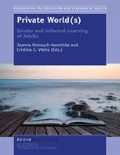Abstract
Power in marriage depends on the social and cultural norms regarding gender roles and expectations addressed to spouses and families. In European societies men are culturally provided with family power, and are called “heads of families”, but together with an increase in the level of economic development power granted to women grows.
Access this chapter
Tax calculation will be finalised at checkout
Purchases are for personal use only
Preview
Unable to display preview. Download preview PDF.
References
Beck, U. (1992). Risk society: Towards a new modernity. Thousand Oaks, CA: Sage Publications.
Biddulph, S. (2003). Manhood: An action plan for changing men’s lives. Sydney: Finch Publishing Pty Limited.
Bron, A. (2006). Rozumienie uczenia się w teoriach andragogicznych. Teraźniejszość-Człowiek-Edukacja. Kwartalnik myśli społeczno-pedagogicznej, 4, 7–24.
Chmura-Rutkowska, I., & Ostrouch, J. (2007). Mężczyźni na przełęczy życia. Studium socjopedagogiczne. Kraków: Oficyna Wydawnicza “Impuls”.
Duch-Krzysztoszek, D. (2007). Kto rządzi w rodzinie. Socjologiczna analiza relacji w małżeństwie. Warszawa: Wydawnictwo IFiS PAN.
Eichelberger, W. (1998). Zdradzony przez ojca. Warszawa: Wydawnictwo “Do”.
Golczyńska-Grondas, A. (2004). Mężczyźni z enklaw biedy. Rekonstrukcja pełnionych ról społecznych. Łódź: Przedsiębiorstwo Specjalistyczne ABSOLWENT.
Goldberg, H. (1979). The new male: From self-destruction to self-care. New York, NY: William Morrow & Co.
Howard, J. A., Blumstein, P., & Schwartz, P. (1986). Sex, power, and influence tactics in intimate relationships. Journal of Personality and Social Psychology, 51, 102–109.
Janeway, E. (1981). Power of the weak. New York, NY: Morrow Quill Paperbacks.
Klein, D. M., & White, J. M. (1996). Family theories: An introduction. Thousand Oaks, CA: Sage Publications.
Lips, H. M. (1991). Women, men, and power. Mountain View, CA: Mayfield.
Mandal, E. (2000). Podmiotowe i interpersonalne konsekwencje stereotypów związanych z płcią. Katowice: Wydawnictwo Uniwersytetu Śląskiego.
Mandal, E. (2008). Miłość, władza i manipulacja w bliskich związkach. Warszawa: Wydawnictwo Naukowe PWN.
Mead, G. H. (1967). Mind, self, and society: From the standpoint of a social behaviorist. Chicago, IL: The University of Chicago Press.
Nęcki, Z. (1990). Wzajemna atrakcyjność. Warszawa: Wiedza Powszechna.
Oleś, P. (2000). Psychologia przełomu połowy życia. Lublin: Towarzystwo Naukowe KUL.
Ostrouch, J. (2005). The dual-career family as a learning environment. In A. Bron, E. Kurantowicz, H. S. Olesen, & L. West (Eds.), ‘Old’ and ‘New’ worlds of adult learning (pp. 274–284). Wrocław: Wydawnictwo Naukowe Dolnośląskiej Szkoły Wyższej Edukacji TWP.
Ostrouch, J. (2004). Nieuchwytne. Relacje matek i córek w codzienności. Olsztyn: Wydawnictwo Uniwersytetu Warmińsko-Mazurskiego.
Ostrouch-Kamińska, J. (2011). Rodzina partnerska jako relacja współzależnych podmiotów. Socjopedagogiczne studium narracji rodziców przeciążonych rolami. Kraków: Oficyna Wydawnicza “Impuls”.
Ostrouch-Kamińska, J. (2012). Higher education, labour market, and a family: Is it worth being a highly educated woman in Poland. In J. Ostrouch-Kamińska, Ch. Fontanini, & S. Gaynard (Eds.), Considering gender in adult learning and in acadamia: (In)visible act (pp. 205–214). Wrocław: Wydawnictwo Naukowe Dolnośląskiej Szkoły Wyższej.
Stark, E. (2007). Coercive control: How men entrap women in personal life. New York, NY: Oxford University Press.
Strykowska, M. (1992). Psychologiczne mechanizmy zawodowego funkcjonowania kobiet. Poznań: Wydawnictwo Naukowe UAM.
Author information
Authors and Affiliations
Editor information
Editors and Affiliations
Rights and permissions
Copyright information
© 2015 Sense Publishers
About this chapter
Cite this chapter
Ostrouch-Kamińska, J. (2015). (L)earning Power. In: Ostrouch-Kamińska, J., Vieira, C.C. (eds) Private World(s). Research on the Education and Learning of Adults. SensePublishers, Rotterdam. https://doi.org/10.1007/978-94-6209-971-5_3
Download citation
DOI: https://doi.org/10.1007/978-94-6209-971-5_3
Publisher Name: SensePublishers, Rotterdam
Online ISBN: 978-94-6209-971-5
eBook Packages: Humanities, Social Sciences and LawEducation (R0)

